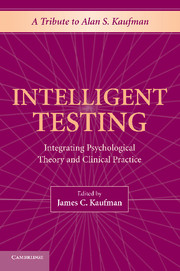Book contents
- Frontmatter
- Contents
- Acknowledgments
- Alphabetical List of Authors and Affiliations
- PART ONE THOSE WHO KNOW HIM
- PART TWO INTELLIGENT TESTING
- PART THREE THE INTERSECTION OF THEORY AND MEASUREMENT
- 8 Kaufman on Theory, Measurement, Interpretation, and Fairness: A Legacy in Training, Practice, and Research
- 9 The Theory of Successful Intelligence as a Basis for New Forms of Ability Testing at the High School, College, and Graduate School Levels
- 10 Kaufman's Work in the Penumbra between Measurement Science and Clinical Assessment
- 11 Success Is a Latent Variable: How Alan Kaufman Shaped Intelligence Test Theory, Interpretation, and Psychometrics with Factor Analysis
- PART FOUR KAUFMAN ACROSS THE WORLD
- Author Index
- Subject Index
- References
8 - Kaufman on Theory, Measurement, Interpretation, and Fairness: A Legacy in Training, Practice, and Research
Published online by Cambridge University Press: 05 August 2012
- Frontmatter
- Contents
- Acknowledgments
- Alphabetical List of Authors and Affiliations
- PART ONE THOSE WHO KNOW HIM
- PART TWO INTELLIGENT TESTING
- PART THREE THE INTERSECTION OF THEORY AND MEASUREMENT
- 8 Kaufman on Theory, Measurement, Interpretation, and Fairness: A Legacy in Training, Practice, and Research
- 9 The Theory of Successful Intelligence as a Basis for New Forms of Ability Testing at the High School, College, and Graduate School Levels
- 10 Kaufman's Work in the Penumbra between Measurement Science and Clinical Assessment
- 11 Success Is a Latent Variable: How Alan Kaufman Shaped Intelligence Test Theory, Interpretation, and Psychometrics with Factor Analysis
- PART FOUR KAUFMAN ACROSS THE WORLD
- Author Index
- Subject Index
- References
Summary
That the very words being read right now might actually find themselves in print was never a sure thing. It is no exaggeration when we say that it took us an inordinate amount of time to complete this chapter and that we needed every last “drop dead” deadline afforded us to accomplish it. Had this been the usual chapter on issues related to our research, we are quite certain we would have had it done much sooner. But this is not a usual chapter. This chapter is most extraordinary in that it is intended to serve as an acknowledgment and an expression of gratitude to a great man whose own professional work and personal character have influenced us in countless ways. Alan Kaufman is this man and we are proud to claim him as both a personal friend and a colleague.
The delays we experienced in writing this chapter had nothing to do with delineating the many ways in which Alan has influenced us. Quite to the contrary, his influence can be found in our own personal and professional histories to an extent that is truly amazing. Our real problem was in trying to limit what to say and in finding just the right tone and manner in which to convey our appreciation for what Alan has meant to us over the years.
- Type
- Chapter
- Information
- Intelligent TestingIntegrating Psychological Theory and Clinical Practice, pp. 99 - 112Publisher: Cambridge University PressPrint publication year: 2009



